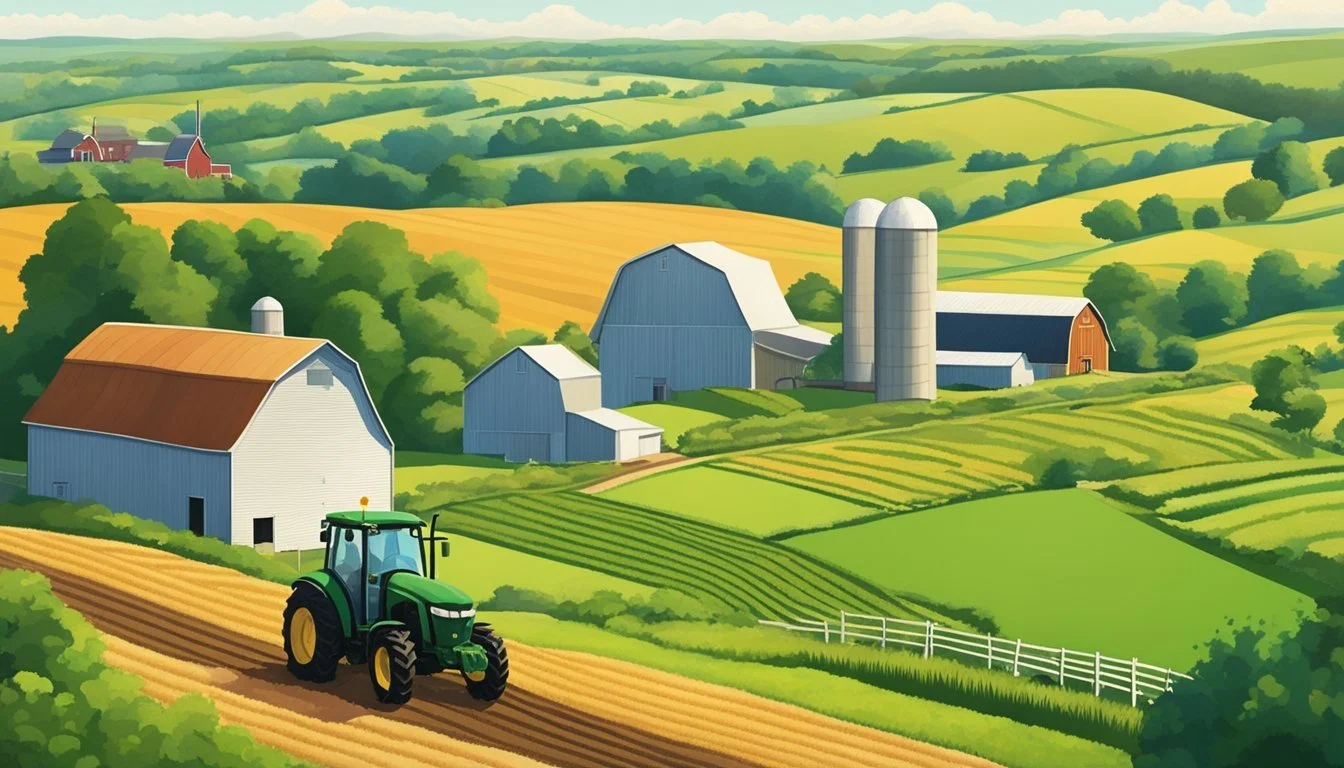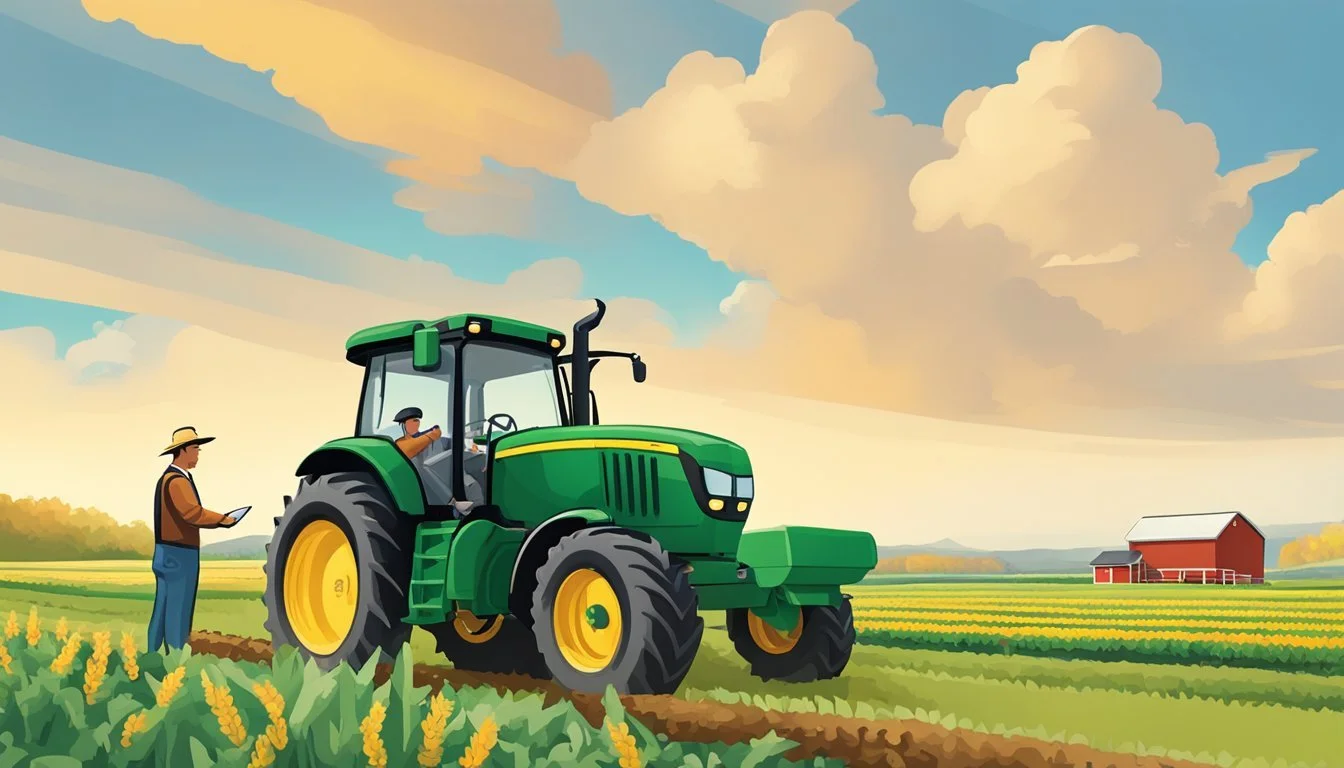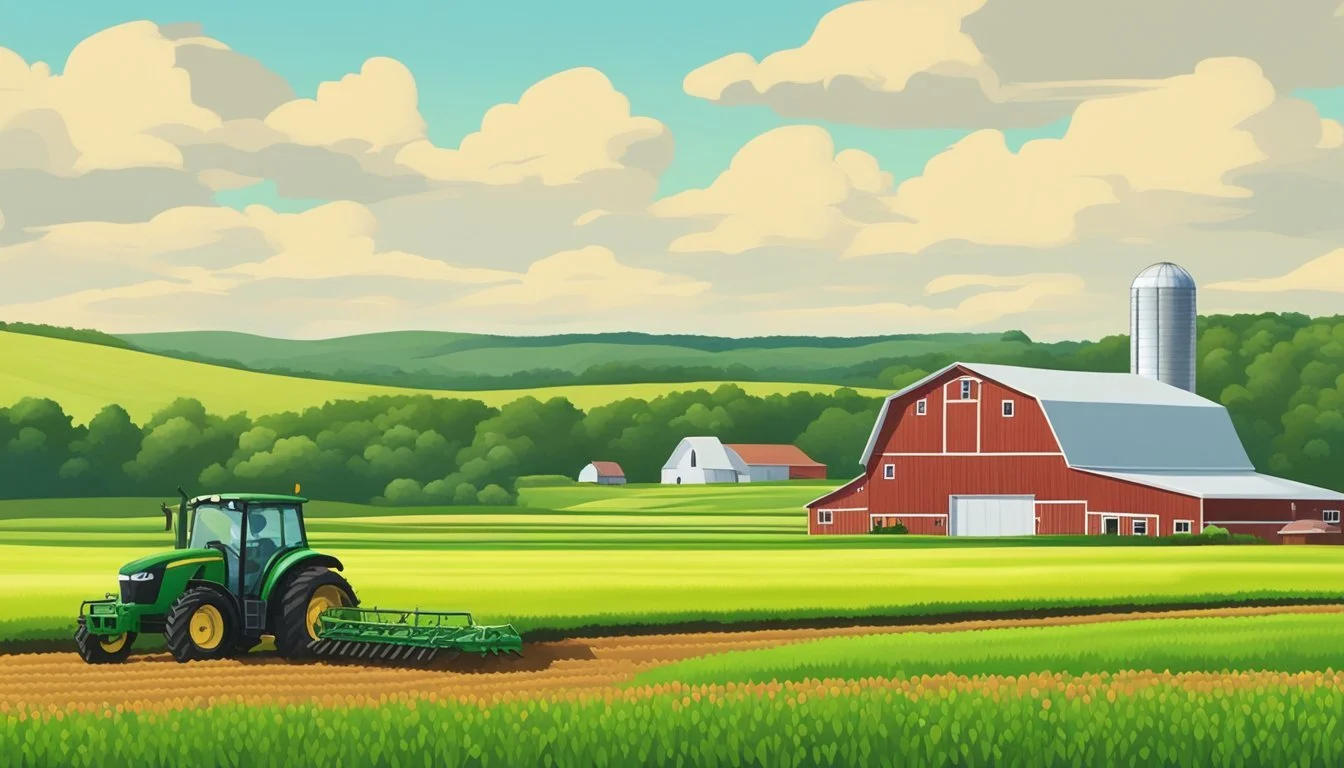Guide to Farming in Massachusetts
Essential Tips for Successful Agriculture
This Article is Part of Our State by State Farming Guide
Farming in Massachusetts presents a unique blend of opportunities and challenges. With its diverse climate and soils, the Commonwealth is home to a variety of farming operations ranging from traditional row crops, dairy, and livestock to specialty crops such as fruits, vegetables, and ornamental plants. Resourceful entrepreneurs considering the agricultural sector in this New England state can tap into a robust network of support and guidance tailored to both nascent and expanding farm businesses.
The landscape of agriculture in Massachusetts is rich and varied, offering an ideal environment for both small-scale and commercial farming endeavors. The state's Department of Agricultural Resources facilitates economically and environmentally sustainable practices, ensuring that new entrants into the farming community have access to up-to-date information and strategies to achieve profitability and growth. From financial management and marketing to risk management and goal setting, farmers receive crucial instruction to optimize their operations.
Understanding the local regulatory climate is essential for agricultural success in Massachusetts. Farmers have access to detailed guides which adapt established frameworks to the peculiarities of the state's agricultural sector, thereby promoting an informed approach to farming that aligns with specific regional requirements. This support structure in Massachusetts paves the way for a thriving agricultural enterprise, celebrating the Commonwealth's agricultural diversity and its role in local and regional economies.
Overview of Farming in Massachusetts
Massachusetts boasts a rich tapestry of agricultural activities, with a supportive framework provided by Mass.gov and a comprehensive set of resources for new and existing farmers.
Massachusetts Agricultural Profile
The Commonwealth of Massachusetts supports a diverse agricultural sector. The state's profile is shaped by both tradition and innovation, with numerous farms that have no identified successor facing an aging population of principal operators. Resources like the "Beginning Farmer Resources" by Mass.gov aim to tackle such challenges, providing essential insights and support to ensure the continuity of farming heritage and the development of new agricultural businesses.
Key Statistics and Trends in Agriculture
Agricultural Statistics:
Number of farms: The state has 7,241 farms.
Land in farms: These farms span 491,653 acres.
Market value: The aggregated market value of agricultural goods exceeds $475 million annually.
According to data from the National Agricultural Statistics Service and the USDA Census of Agriculture, the average farm in Massachusetts yields $65,624 worth of products and covers an area of 68 acres. These figures underscore the economic significance of farming within the state.
Rural and Urban Farming Dynamics
Farming in Massachusetts incorporates both rural and urban settings, reflecting a versatile approach to food production. In urban areas, initiatives focus on making sustainable, nutritious food accessible across different demographics, as highlighted by the mission of entities like New Entry. The Massachusetts Department of Agricultural Resources also emphasizes the need for culturally appropriate food, illustrating the state's commitment to a farming sector that is inclusive and responsive to the needs of its diverse population.
Starting A Farm in Massachusetts
In Massachusetts, beginning farmers have access to a range of programs and resources aimed at facilitating a smooth entry into the agriculture industry. From land acquisition to business planning, the Commonwealth offers structured support to ensure the sustainable establishment of farming businesses.
Understanding the Basics
Farming in Massachusetts demands a solid grasp of the agricultural framework, including the climate, soil types, and local crops. Beginning farmers should familiarize themselves with the state's unique conditions and consider enrolling in educational programs on sustainable farming practices. The Massachusetts Department of Agricultural Resources (MDAR) serves as an invaluable resource, offering information and programs tailored to new and beginning farmers.
Accessing Land and Resources
Finding suitable land is a critical first step in starting a farm. Massachusetts supports beginning farmers through various land access programs, including MDAR's Matching Enterprise Program for Agriculture and the Agricultural Preservation Restriction Program, which provides opportunities to lease or purchase farmland at affordable rates. Resources for finding land include:
MDAR programs: Land access initiatives aimed at beginning farmers.
Agricultural organizations: Guidance and listings for available farmland.
Local workshops: Information sessions on how to effectively secure farmland.
Organic Certification Process
For those interested in organic farming, the organic certification process is overseen by certifying agencies accredited by the USDA's National Organic Program. It involves:
Compliance: Adhering to organic standards in farm practices.
Application: Submitting detailed farm plans to a certifying agency.
Inspection: Undergoing an on-site farm inspection.
Gaining organic certification bolsters market value and taps into consumer demand for sustainable produce.
Business Planning and Management
Developing a robust business plan is paramount for the success of a new farming venture. Resources like "An Entrepreneur's Guide to Farming in Massachusetts" provide practical fact sheets on topics ranging from crop insurance to marketing strategies. Farmers can also seek business planning assistance from agricultural organizations in Massachusetts:
Financial management: Training on managing farm finances.
Marketing strategies: Understanding the local market and identifying outlets for produce.
Risk management: Information on crop insurance and disaster assistance programs.
Utilizing these resources, beginning farmers can lay a strong foundation for a thriving farming business in Massachusetts.
Financial Management and Support
In Massachusetts, farming entrepreneurs have various avenues to secure financial sustainability and growth. Resources including grants, specialized workshops, and risk management strategies are available to support their business plans.
Securing Financing and Grants
Farmers in Massachusetts can tap into a range of financing options and grant programs designed to support agricultural endeavors. The Massachusetts Department of Agricultural Resources (MDAR) offers Farm Improvement Grants and opportunities for Agricultural Composting Improvement. Additionally, the Agriculture Preservation Restriction (APR) Program helps protect farmland while enabling farmers to secure capital for operations. Entrepreneurs planning to start or grow their farms may also find federal aid through the USDA, which provides various loan programs tailored to the needs of the farming community.
Risk Management Strategies
Effective risk management is crucial for maintaining a resilient farm business. Farmers can adopt a variety of strategies to mitigate financial risk, including crop insurance and diversification of farm products. MDAR, along with agencies like the USDA, often provides guidance on risk management through educational resources and potential funding for implementing precautionary measures.
Financial Planning Workshops
For those seeking to enhance their financial management skills, workshops offer practical training and advice. The Agricultural Business Training Program (ABTP) enrolls experienced farmers for courses on financial management, which cover budgeting, marketing, and setting achievable goals. Aspiring and established farmers alike can benefit from these workshops to ensure a comprehensive understanding of the financial aspect of their operations. Schedules for these workshops can typically be found on the MDAR's calendar or through cooperative extensions in Massachusetts.
Marketing and Sales Strategies
When pursuing profitability in farming, understanding and implementing sound marketing and sales strategies are paramount. These strategies enable farmers to effectively position their agricultural products in the market, ensuring their farmland yields not just crops, but also a viable business.
Developing Effective Marketing Plans
A successful marketing plan for a farm business should begin with a thorough market analysis. This includes identifying target customer segments and understanding their needs. Farmers should establish clear financial goals and assess their farm's position within the market. They can then set achievable objectives that include specific actions, such as diversifying crops or engaging in direct sales, to increase market presence.
Objectives: Identify target customers, set financial goals, market assessment
Actions: Crop diversification, direct sales
Exploring Marketing Outlets
There are multiple marketing outlets available to farmers in Massachusetts. Traditional avenues such as local farmers markets, CSA (Community Supported Agriculture), and wholesale to restaurants remain important. Additionally, farmers should explore modern outlets like online sales platforms and social media, which can reach a wider audience and create direct connections with consumers.
Traditional Outlets: Farmers markets, CSA, Wholesale
Modern Outlets: Online sales, Social media
Branding and Promotion
Branding and promotion are crucial in differentiating a farm's products. Effective branding communicates the farm's values and the quality of its products, resonating with the ideal customer base. Promotional activities might include hosting on-farm events, community outreach, and creating appealing online content. These efforts help build a strong network and foster loyalty among customers.
Branding: Communicate values, Product quality
Promotion: On-farm events, Community outreach, Online content
Farming Infrastructure
Effective farming infrastructure is crucial for the productivity and sustainability of agricultural operations. Farmers in Massachusetts need to consider various aspects, including building structures, processing livestock, and implementing conservation measures.
Building and Managing Farm Infrastructure
Farm infrastructure encompasses essential structures such as barns, greenhouses, and storage facilities. Barns serve multiple purposes including housing for livestock, storage for feed, and a workspace for farmers. It's important that these structures are well-ventilated and designed to accommodate the specific needs of the farm. Greenhouses are vital for extending the growing season in Massachusetts’s variable climate. Proper greenhouse management involves regulating temperature, humidity, and ensuring adequate ventilation. Storage facilities must protect produce and equipment from the elements, pests, and potential theft. Security measures and proper organization within these facilities are also significant considerations for maintaining an efficient workflow.
Livestock Handling and Processing
To manage livestock efficiently, proper handling and processing infrastructure is necessary. Farmers should design handling facilities to minimize stress on animals and ensure the safety of both animals and handlers. This can include chutes, holding pens, and proper fencing. Livestock processing facilities need to comply with state regulations and sanitary requirements. Farmers may utilize on-site or regional processing centers, and must consider factors like transportation, capacity, and by-product management. Adhering to humane processing standards is paramount for ethical operations and marketability.
Sustainability and Conservation Measures
Sustainability is increasingly important in modern agriculture. Farms are integrating conservation measures to preserve natural resources and foster ecological balance. Techniques like crop rotation, organic farming, and soil conservation help maintain healthy land for long-term production. Sustainable farming practices also include water management systems that prevent wastage and pollution. By implementing rainwater harvesting and efficient irrigation systems, farms can reduce their water consumption and impact on local waterways. Energy conservation initiatives such as solar panels and wind turbines contribute to reducing the environmental footprint of farm operations.
Legal and Regulatory Compliance
In Massachusetts, farmers must adhere to a set of legal and regulatory standards to ensure they operate within the state’s guidelines for agricultural practices. This includes understanding conservation laws, food safety protocols, and navigating the intricate regulations that govern farming activities.
Navigating Agricultural Regulations
Farmers in Massachusetts are subject to various state regulations that govern land use, animal health, and crop production. Compliance with the Massachusetts Department of Agricultural Resources (MDAR) is critical, as it regulates and enhances the agricultural community to promote economically and environmentally sustainable practices. Farmers should consult with MDAR for a comprehensive directory of programs and services designed to aid in meeting regulatory requirements. Engaging with service providers for legal assistance can ensure regulations are followed meticulously.
Understanding Conservation Easements
Conservation easements are legal agreements that permanently limit uses of the land to protect its conservation values. In Massachusetts, entities like Equity Trust work to promote equitable land access and sustainable farming. They may hold conservation easements that help farmers by preserving farmland and providing long-term stability, but farmers must comply with the specific terms set out in each easement. Understanding these details is crucial for maintaining legal use of the land and qualifying for associated benefits.
Food Safety and Quality Assurance
Ensuring the food produced adheres to safety and quality regulations is a cornerstone of Massachusetts agriculture. The state mandates strict adherence to food safety measures, such as the implementation of Good Agricultural Practices (GAPs) and compliance with the Food Safety Modernization Act (FSMA). Farmers must regularly monitor their operations and partake in required inspections to guarantee that their products meet all safety standards and to maintain public trust in the local food system.
Education and Extension Services
Massachusetts offers a range of education and extension services that equip farmers with the knowledge and skills necessary to thrive in the state's diverse agricultural climate. These resources are designed to support both new and experienced farmers through various stages of farm development and management.
Extension Programs and Resources
The University of Massachusetts Extension (UMass Extension) operates as an educational outreach branch of the UMass Amherst Center for Agriculture, Food, and the Environment. Besides serving the entire Commonwealth, it maintains a partnership with the national Cooperative Extension System, established by the Smith-Lever Act of 1914. Resources include:
Agricultural Business Training Courses: Tailored to assist those considering or beginning a farming enterprise.
UMass Extension Services: Offers region-specific advice and assistance across Massachusetts.
Training and Workshops for Farmers
The Massachusetts Department of Agricultural Resources facilitates a variety of training opportunities and workshops to enhance the practical know-how of local agricultural entrepreneurs:
Beginning Farmer Resources: Focuses on entry-level education for farmers starting their agribusiness journey.
Massachusetts Grown...and Fresher!: Engagements designed to connect agricultural education with the local farming community.
The New Entry Sustainable Farming Project and the Beginning Farmer Network of Massachusetts are instrumental in promoting these educational initiatives. They offer:
Workshops on topical issues in farming
Training aimed at business planning and operation
Specialized workshops addressing agricultural techniques and practices
Independent Fact Sheets and Guides
Farmers in Massachusetts have access to a plethora of independent fact sheets and guides that serve as quick-reference materials:
Adapted guides, such as the Entrepreneur's Guide to Farming in Massachusetts, offer regulatory, programmatic, and issue-specific information tailored to the state context.
The Beginning Farmer Network of Massachusetts and other organizations provide targeted resources for essential farm management knowledge.
These independent resources are crucial tools farmers can employ to navigate the complexities of agriculture in Massachusetts.
Community and Economic Development
The agricultural sector in Massachusetts supports both rural and urban communities by fostering entrepreneurial efforts and contributing to local economies. Farmers and farm businesses play a critical role in this symbiotic relationship, which thrives on the availability of resources and a strong network of support.
Building a Community of Farmers
In Massachusetts, the creation of a dynamic and inclusive farmer community is key. Service providers, experienced growers, and guides—such as the "Entrepreneur's Guide to Farming in Massachusetts"—offer essential support. This collective effort not only aids existing farms but also encourages new participants, including immigrant and refugee populations, to embark on agricultural endeavors. Key initiatives may include:
Networking Events: Facilitating connections among farmers for the exchange of knowledge and resources.
Mentorship Programs: Pairing new entrants with seasoned practitioners to bridge the experience gap.
Entrepreneurship in Agriculture
The entrepreneurial spirit is crucial in developing the farming industry. Resources tailored for farm business planning, such as the aforementioned entrepreneur's guide, provide foundational insights. Within these guides, potential and current farmers find critical information on:
Business Planning: Detailed steps for creating a viable farm business model.
Market Analysis: Tools to identify and evaluate selling opportunities in both rural and urban markets.
Agricultural Economy Perspectives
The agricultural economy in Massachusetts is multifaceted, shaped by factors like land access, food security, and sustainability. The state's Farmland Action Plan reflects an understanding of these factors and outlines strategies to bolster the agricultural economy. Important aspects include:
Land Conservation: Efforts to preserve farmland for continued agricultural use.
Support for Urban Farming: Initiatives to make farming viable in urban settings, increasing local food production and accessibility.
Farmers and associated businesses are nurtured through programs and information dissemination, ensuring a robust agricultural economy and the development of diverse farming communities throughout Massachusetts.
Case Studies and Success Stories
The landscape of Massachusetts agriculture showcases a rich tapestry of success stories and innovative practices. Insightful case studies and profiles bring to light the accomplishments of local farms and the lessons they offer for sustainable and profitable farming.
Profiles of Successful Massachusetts Farms
In Massachusetts, family-run farms such as Doe's Organic Farm have become role models in the community, achieving economic viability while maintaining environmental stewardship. These farms often work closely with the United States Department of Agriculture to implement programs that support local ecosystems and market growth.
Innovations in Massachusetts Agriculture
A wave of innovation sweeps through the Commonwealth's agricultural sector, with farms adopting new technologies and farming methods. Initiatives in sustainable farming — using crop rotation, organic methods, and soil conservation techniques — set Massachusetts apart, thanks to support from organizations like Land For Good that help farmers make optimal use of their land.
Lessons Learned and Best Practices
Experience underpins the success of Massachusetts' farms, with experienced farmers sharing knowledge to shape best practices across the region. Lessons learned emphasize the importance of resourceful business management, adaptability, and thorough understanding of local regulations. These lessons, alongside sustainable practices, forge a path for emerging farmers to succeed in a competitive marketplace.
Resources and Tools for Farmers
Massachusetts provides a comprehensive suite of resources and tools tailored to support the agricultural sector. Farmers in the Commonwealth have access to state-backed programs, extensive networks, and the latest industry updates essential for optimizing farm productivity and business success.
MassGrown Map and Directory
The MassGrown Map and Directory is a versatile tool offered by the Massachusetts Department of Agricultural Resources (MDAR). It facilitates easy location of local farms, farmers' markets, and agricultural events across the state. Additionally, this resource assists farmers in promoting their products and services, hence bolstering the visibility of their businesses within the state's agricultural industry.
Features:
Farm location maps
Listing of agricultural events
Farmer Networks and Associations
Farmer networks and associations play a pivotal role in the agribusiness landscape. These entities offer support through technical assistance, networking opportunities, and access to collaborative programs. They also aid farmers in developing robust farm business plans and enhancing their role as a principal operator in the agricultural market. Resources like the Beginning Farmer Network of Massachusetts provide valuable platforms for both new and experienced farmers to exchange knowledge and skills.
Key Offerings:
Networking events
Business planning support
Skill development workshops
Up-to-Date Agricultural Updates and News
Staying informed with the latest agricultural updates and news is crucial for Massachusetts farmers. MDAR provides timely statistical data and advisories that farmers can leverage to stay ahead of industry trends and regulatory changes. Regular updates ensure that farmers can make informed decisions and adapt their practices to current market demands.
Information Dissemination Channels:
Newsletters and bulletins
Online portals
Industry reports
Looking Ahead
In Massachusetts, the landscape of agriculture continues to evolve with a strong focus on sustainable practices and initiatives to support new farmers entering the field.
Future Trends in Local Farming
Sustainable Farming: With climate change concerns and the shift towards environmentally friendly practices, sustainable farming has become a major trend in Massachusetts. Innovative techniques such as precision agriculture, organic farming, and the utilization of renewable energy are gaining traction. The state's farmers are increasingly adopting such practices to ensure the longevity of their lands and address the growing consumer demand for sustainable products.
Beginning Farmer Network of Massachusetts (BFN/Mass): As the average age of farmers remains high, with many lacking identified successors, organizations like the Beginning Farmer Network of Massachusetts become vital. BFN/Mass plays a pivotal role in fostering future trends by supporting new and prospective farmers through resources, training, and community building, thereby shaping the next generation of Massachusetts' agriculture.
Continued Education and Advocacy
Massachusetts farming relies heavily on education and advocacy to adapt to future agricultural challenges and opportunities.
Updates: There is a continual need for farmers to stay informed about regulatory updates, advanced farming techniques, and market changes. Regular workshops, farming guides, and resources provided by local agricultural organizations are imperative to maintain a knowledgeable farming community.
Advocacy: Supporting policies that benefit farming, promoting local produce, and influencing public perception are crucial. Agricultural agencies and industry groups will likely persist in advocating for favorable legislation and increased funding for farming initiatives in the Commonwealth.
By focusing on these areas, Massachusetts agriculture can look forward to a resilient and thriving future.











